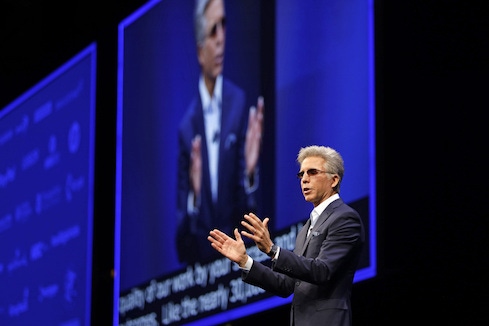ERP Giants SAP and Oracle Add AI to Platforms
As CIOs and other IT leaders shift their AI programs to incorporate more buying than building from scratch, vendors are adding new artificial intelligence capabilities to their platforms to meet the demand.

CIOs and other members of the C-suite know that they need to invest in artificial intelligence and related technologies if they want to remain competitive in the years to come. But surveys show that the process tends to take longer than anticipated. You may start out with the idea that you are going to build it all from scratch, maybe with open source technology that's preferred by the brilliant data scientists and engineers you plan to recruit. Yet a year later, you may still only have a pilot in the planning process and nothing in production.
That's not an uncommon experience these days. An informal audience poll during the recent Gartner Data and Analytics Conference revealed just 30% of audience members planned to build AI capabilities themselves (compared to nearly the entire audience, when asked the same question in the same session a year earlier). What's more, this year during that informal audience poll about half the audience said they would use applications with AI capabilities built-in.
That's just what some of the big software vendors have been hoping you would say.
At its SAPPHIRE Now event in Orlando, Florida earlier this month, SAP announced a series of innovations to its SAP s/4HANA ERP platform to make it easier to add artificial intelligence and robotics and to customize apps.
SAP said that the new release, available this month, included "100 out-of-the-box AI and robotic process automation-powered capabilities," helping the company towards its goal to automate 50% of manual tasks in its ERP system by sometime in 2021.
These new features include capabilities that will enable SAP shops to simulate new business models and commercial offers, so they can, for instance, analyze the impacts of subscription and usage pricing. SAP said the enhancements would also enable intelligent product design and faster go-to-market time as well as personalized products and services. As examples of some of the new AI capabilities, SAP named intelligent accruals management, defect code proposal, and financial journal entry with intelligent robotic process automation.
Another ERP giant, Oracle, announced a fresh round of AI enhancements to its product lineup during its Modern Customer Experience event in Las Vegas in March. The company said new AI enhancements included expense reporting assistant, project management digital assistant, and advanced financial controls, among others.
Adding these capabilities to their platforms is part of a longer-term plan for vendors like Oracle and SAP. Consider Oracle's acquisition last year of DataScience.com, a platform that centralizes data science tools such as R and Python, projects, and infrastructure into a governed workspace. Executives at Oracle plainly laid out that strategy last year when they announced the deal.
"Every organization is now exploring data science and machine learning as a key way to proactively develop competitive advantage, but the lack of comprehensive tooling and integrated machine learning capabilities can cause these projects to fall short," said Amit Zavery, executive vice president of Oracle Cloud Platform, back when the company announced the deal.
Many organizations may start their data science and machine learning initiatives using free or low-cost open source software and public cloud offerings, according to Gartner, but then move onto commercial software for broader use cases and applications that require team collaboration. Commercial software also helps them operationalize their deployment and management of models using enterprise grade capabilities, the analyst firm said in the 2019 edition of its Magic Quadrant report for Data Science and Machine Learning. If Oracle or SAP aren't your first choices, you may not have to wait long for other options. Gartner previously predicted that AI technology will be built into almost every new software product by 2020.
About the Author(s)
You May Also Like







